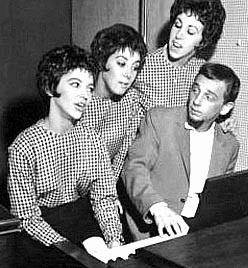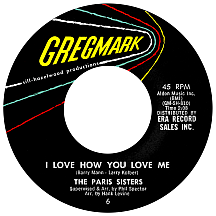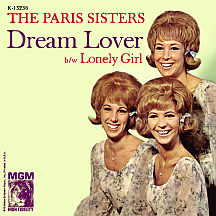THE PARIS SISTERS
I Love How You Love Me
At the age of two, Priscilla Paris sang, danced and twirled around onstage with older sisters Albeth and Sherrell. Mother Faye Paris, a former singer with limited success in opera, aggressively promoted the child act in the early 1950s, first as tap dancers doing semi-acrobatic stunts, then as singers performing for military troops. What a life The Paris Sisters had, starting as soon as each was old enough to walk! By the time these San Francisco girls had begun working professionally, they'd already been weaned on a steady diet of Andrews Sisters records, part of mom's plan to fashion them as a similarly-styled trio; later, a voice coach helped develop their vocal harmony. The girls got a chance to meet the Andrews Sisters backstage during an appearance at a San Francisco theater, resulting in an impromptu onstage performance, with their idols, of "Rum and Coca-Cola." In 1954, the Paris girls were signed to a contract with Decca (the Andrews' former label), not long after The McGuire Sisters had begun recording for the company's affiliate label Coral.
They were like three variations of the same pop trio: the thirty-something Andrews, twenty-something McGuires and pre-adolescent Paris Sisters. The maturity in the voices as revealed in the grooves of the earliest Paris singles from '55, "Ooh La La" and "Huckleberry Pie," is disconcerting; though Albeth was about 14, Sherrell 12 and Priscilla 10, they sounded adult (they've admitted to lying about their ages by adding a few years, wearing makeup and dressing more mature in hopes that the image might match the sound). Years ago I obtained my first of their Decca discs, "Dream Boy" (the sixth single, from late '55), and, being familiar only with the '60s records, was baffled by what I heard; I would have been positive it was a different, much older group, if it hadn't been for songwriting credit on the flip side showing the full names of all three sisters.
Mother Paris desperately wanted her daughters to succeed but in the process effectively robbed them of anything close to a normal childhood; the trio even performed in Las Vegas casinos while in their teens. A great deal of promise is evident on those early recordings (despite backing the marginally-talented Gary Crosby, Bing's son, on four sides), but none sold well, though Decca surprisingly kept them around for two years. A pair of singles on Imperial in 1957 were ever-so-slightly more age-appropriate (hot songwriters Doc Pomus and Mort Shuman penned one song), but afterwards the girls went more than three years without an opportunity to make records.
In 1961 their mother connected with Lester Sill, a music publisher and record producer who had worked with R&B acts since the mid-1940s at Modern, Atlantic and other labels and had more recently overseen the work of producer Lee Hazlewood (primarily on the hit recordings of Duane Eddy) and a relative newcomer, Phil Spector. He showed interest in the act and suggested Spector give them a try. Phil, whose breakthrough had come in 1958 with The Teddy Bears ("To Know Him, is To Love Him") didn't want to be bothered at first, but after hearing Priscilla, whose voice reminded him of Teddy Bears lead singer Annette Kleinbard, he immersed himself in the project; it was an opportunity to relive his early days, recent but bygone, by producing songs similar to those of his chart-topping first group.
"Be My Girl," written by Phil and his sister Shirley (using the pseudonym Cory Sands) and recorded by Ray Peterson (it was on the flip side of his early-'61 hit "Corinna, Corinna"), was lyrically altered to "Be My Boy" and recorded with Priscilla singing close to the microphone in an intimate, sexy way that wasn't at all the intention of the 16-year-old. The two older sisters resented his choosing Priscilla to be the lead singer, which led to considerable animosity between the three, but none of that mattered to Spector, whose main interest was the finished product. Sill had no luck getting a record company interested in the master, so he and Hazlewood started their own label, Gregmark (originally the title of Sill's publishing company), and released it themselves under a distribution deal with Era Records. By May of '61 it had risen nearly halfway up the national charts.
The second Paris single on Gregmark was "I Love How You Love Me," a song composed by Barry Mann and Larry Kolber. Hank Levine, a young arranger based in Hollywood (he hit the charts with a two-part instrumental, "Image," around that time), was hired to do the string arrangement to Phil's specifications, which he planned to make more prominent than on the previous single. Spector labored over the song, spending several days working on the separately-recorded elements in search of a subtle, effective mix. B side "All Through the Night," a buoyant, uptempo 'la-la-la...' teen tune, may have served as insurance should the public reject a second ballad, but Spector's hunch was right: that fall, "I Love How You Love Me" landed the Paris Sisters in the top ten.

Sill and Phil started the Philles label around this time. Spector had been shuttling between New York and Los Angeles while getting Philles going with the first release, The Crystals' "There's No Other (Like My Baby)," just as the Paris single went top ten; he managed to squeeze in the time to make more records with the trio in L.A. Then Priscilla informed her sisters of a rather shocking bit of news: she was pregnant! As her "baby bump" became obvious, an adjustment in clothing style became necessary; the girls began wearing matching "empire line" outfits, a 19th-century style of dress with a high waistline that had been revived, with modifications, in the 1960s. Carefully fitted, it hid her condition and helped deter scandal (when they appeared on American Bandstand, Dick Clark didn't even notice). She gave birth to a boy and married the father, but the marriage didn't last long; afterwards there was a hint of romance between Priscilla and Phil (who may not have been aware she was underage...or may not have cared), but it didn't progress very far.
In early 1962, the sisters' recording of Gerry Goffin and Carole King's "He Knows I Love Him Too Much," another Spectorized ballad, made the top 40. An appearance in the British film It's Trad, Dad! (the first feature by future Hard Day's Night director Richard Lester) singing the oh-so-similar but nevertheless infectious "What Am I To Do" (penned by Pomus and Spector) suggested they might still be on the hitmaking track; that song ended up on the flip side of Mann and Kolber's "Let Me Be the One," a May '62 low-charter. An album's worth of songs, recorded in Spector's usual painstaking way, had gone missing, apparently tossed out by one of Sill's assistants. So there was no album released and, in the end, neither Phil nor the girls made much money, despite there being well over a million copies sold of the four singles. The sisters, fed up with the situation, caused a scene at Sill's office. He reacted by canceling their contract. There was a fifth single, "Yes - I Love You," and that was that.
A couple of years passed before they finally got another shot. "Dream Lover," a remake of Bobby Darin's 1959 hit, was made to sound very close to the Spector-produced ballads, a style producer Nick Venet figured fit the public's expectations; the MGM single spent a few weeks on the national charts in June and July 1964. Clothing and hairstyles evolved but were always uniform; during their peak of popularity, the Paris Sisters wore short brunette pixie cuts, later there were bouffant-style blonde wigs, later still it was a long bleach-blonde look. Eventually they began dressing and styling themselves individually. They moved to Mercury later in the year, then worked with Jack Nitzsche at Reprise for four singles in '66 and '67, followed by a one-shot for GNP Crescendo and a final single for Capitol in '68, Goffin and King's "Golden Days," a "sunshine pop" tune meant to separate them from their by-then unwanted signature Spector sound. None of the records over that long span were successful and the trio, relationships strained to the breaking point, finally split up.
Albeth, Sherrell and Priscilla felt they didn't quite fit into the '60s music scene, yet it became unavoidable once they connected with notorious mastermind producer Phil Spector. His habit of using artists to achieve a desired result, only to leave them behind for the next project, became painfully obvious to them once the whirlwind of '61-'62 had ended. Little sis Priscilla continued as a solo perfomer, recording for the York and Happy Tiger labels in the late '60s, writing many of her own songs. Albeth and Sherrell later worked behind the scenes in television. As a family act, The Paris Sisters had spent seven years making records before finding the one song for which they will always be remembered, followed by another seven years capitalizing on their fame as best they could prior to the inevitable breakup. All in all their career together lasted more than 20 years, an accomplishment few can boast.



